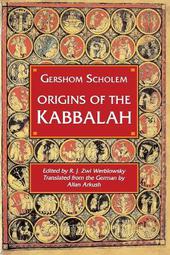
|
Origins of the Kabbalah
Paperback / softback
Main Details
| Title |
Origins of the Kabbalah
|
| Authors and Contributors |
By (author) Gershom Gerhard Scholem
|
|
Translated by Allan Arkush
|
| Physical Properties |
| Format:Paperback / softback | | Pages:504 | | Dimensions(mm): Height 235,Width 152 |
|
| Category/Genre | Judaism
Sacred texts |
|---|
| ISBN/Barcode |
9780691020471
|
| Classifications | Dewey:296.16 |
|---|
| Audience | | Professional & Vocational | | Tertiary Education (US: College) | |
|---|
|
Publishing Details |
| Publisher |
Princeton University Press
|
| Imprint |
Princeton University Press
|
| Publication Date |
21 January 1991 |
| Publication Country |
United States
|
Description
One of the most important scholars of our century, Gershom Scholem (1897-1982) opened up a once esoteric world of Jewish mysticism, the Kabbalah, to concerned students of religion. The Kabbalah is a rich tradition of repeated attempts to achieve and portray direct experiences of God: its twelfth-and thirteenth-century beginnings in southern France and Spain are probed in Origins of the Kabbalah, a work crucial in Scholem's oeuvre. The book is a contribution not only to the history of Jewish medieval mysticism but also to the study of medieval mysticism in general and will be of interest to historians and psychologists, as well as to students of the history of religion.
Reviews"[Scholem] labors the wealth, even the scandal, of the past in order to multiply options of survival. No great textual scholar, no master of philology and historical criticism commands a technique at once more scrupulously attentive to its object and more instinct with the writer's voice. That voice reaches out and grabs the layman."--George Steiner, The New Yorker "[Scholem's] work on Jewish mysticism, messianism, and sectarianism, spanning now half a century, constitutes ... one of the major achievements of the historical imagination in our time. I would contend that it is of vital interest not only to anyone concerned with the history of religion but to anyone struggling to understand the underlying problematics of the human predicament."--Robert Alter, Commentary "This book has been a classic in its field since it was first issued in 1950, and it still stands as uniquely authoritative and intriguingly instructive... [It is] a monument of revelation and insight bridging anthropology, religion, sociology, and history."--Publishers Weekly
|